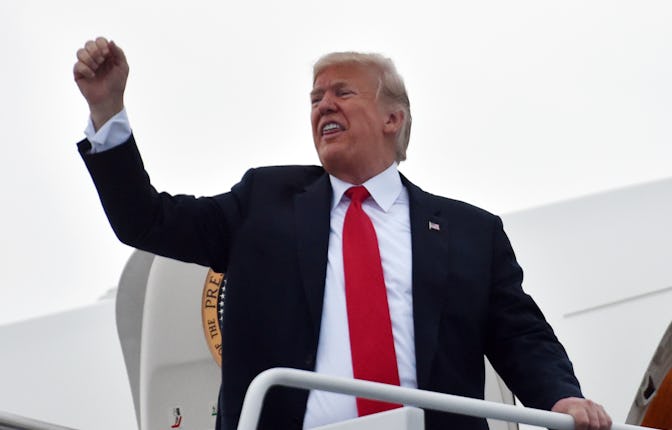Everyone is focusing on the wrong part of Trump’s NPR interview
His method of ending the call is hardly the most noteworthy thing about it.

Late Tuesday afternoon, National Public Radio host Steve Inskeep announced that after six long years of trying, he’d finally landed an interview with former President Donald Trump — a juicy one, from the sound of it — and promised to release his recording of their conversation “up to the moment that he hung up on me.” Wow, exciting stuff!
So when Inskeep published the full transcript — and footage — of his interview with Trump, it’s understandable that expectations were fairly high. Instead, what we got was... fine? Nothing particularly Earth shaking, really. Just a fairly boilerplate rehash of Trump’s greatest hits on the COVID-19 pandemic (“And being very — the proud person that did so well with therapeutics and, and vaccines and everything else and getting them done in record times, you know, I — I have a lot to say on the subject”), and his 2020 electoral loss (“This was a corrupt election”), and his various feuds with Republicans he deems insufficiently loyal (“Mitch McConnell is a loser”), and crowd size (“How come Biden couldn't attract 20 people for a crowd?”).
The whole thing — around nine minutes total — ends rather abruptly, with Trump thanking Inskeep and hanging up after delivering an extended rant about his presidential defeat and rigged elections, as well as his generic slate of personal grievances thereof.
“Woah, woah, woah, I have one more question,” Inskeep interjects in a valiant attempt to keep Trump on the line for a few seconds more. “I want to ask about a court hearing yesterday on Jan. 6. Judge Amit Mehta. He's gone. OK.”
Is it a moderately rude, ungenerous way to end a fairly straightforward interview? Sure, of course. This is Donald Trump we’re talking about here. But listening to the final seconds of the recorded conversation, it’s fairly generous to say — as some media outlets and pundits have — that Trump “rage-quit,” or “cut the interview short to protect his delusional fantasy,” or that he’d been “melting down” during the call. Instead, this seems like a comparatively benign interview with someone who has spent the past five-plus years ranting like a sincere lunatic. Have people forgotten what an actual rage-quitting, melting-down, delusional Trump sounds like? If this is the credulity some are willing to lend Trump after years of genuinely bonkers behavior, then things don’t bode well for how the media might treat him should he run again in 2024.
Which isn’t to detract from Inskeep’s sincerely admirable interview work — he never cowed and was willing to offer factual counter-examples and point out obvious fallacies. The NPR interview itself is entirely solid, regardless of whether it actually broke any substantive “news” — at least not in terms of content.
What is noteworthy, however, is not so much what Trump said, or how he ended the conversation, but the fact that he acquiesced to NPR’s longstanding interview request in the first place. For someone who has spent his year out of office speaking almost exclusively to his preferred network of fascist-enabling media outlets, the sudden decision to speak with National Public Radio, of all places, is conspicuous to say the least — particularly given the increasing likelihood that he will indeed run for a second term in office in the coming years. While nothing Trump said in his interview was of tremendous note — or, at least, wasn’t anything we hadn’t heard him say a million times over in a million other formats — the fact that he suddenly deigned to say them to NPR seems far more important in and of itself than how he ended the call.